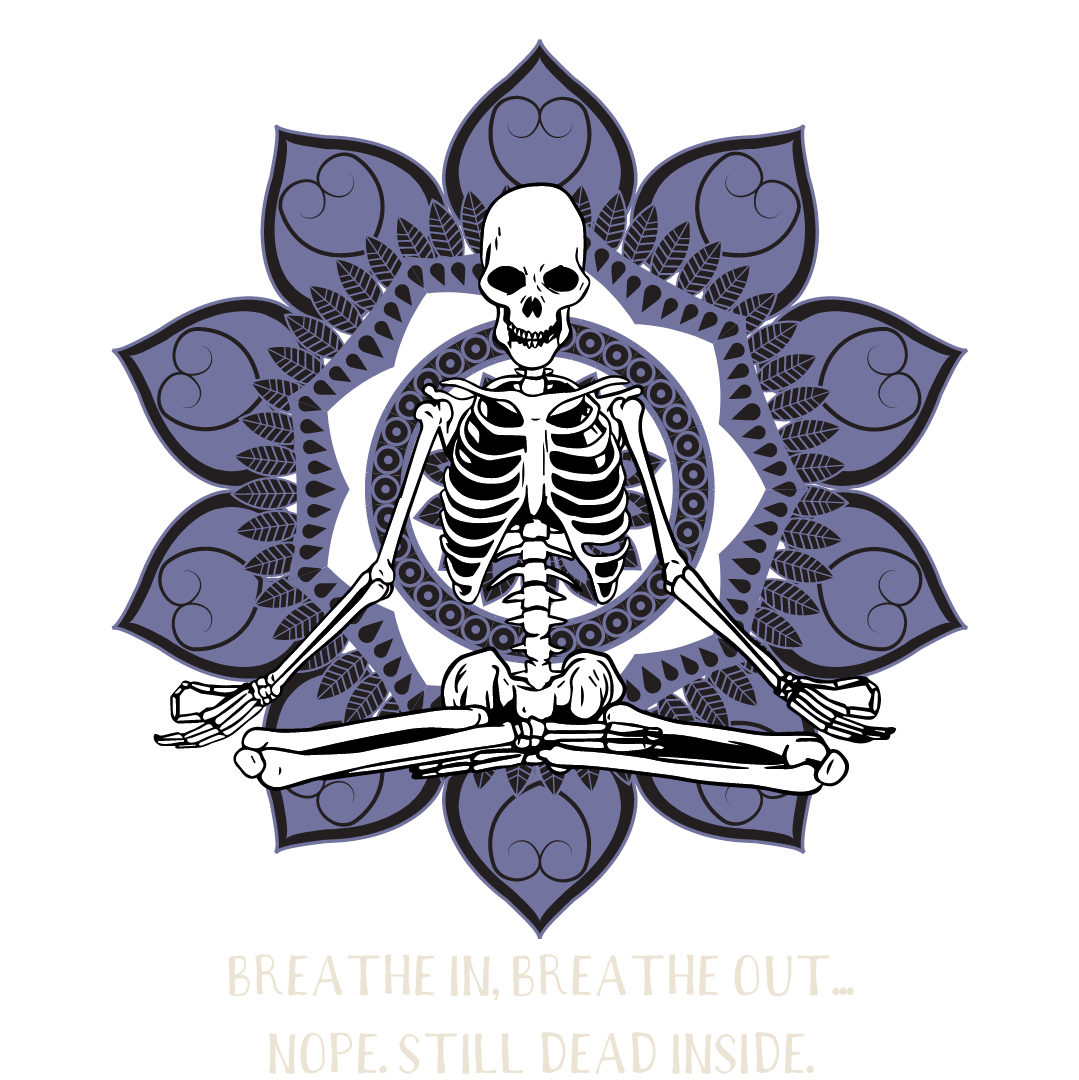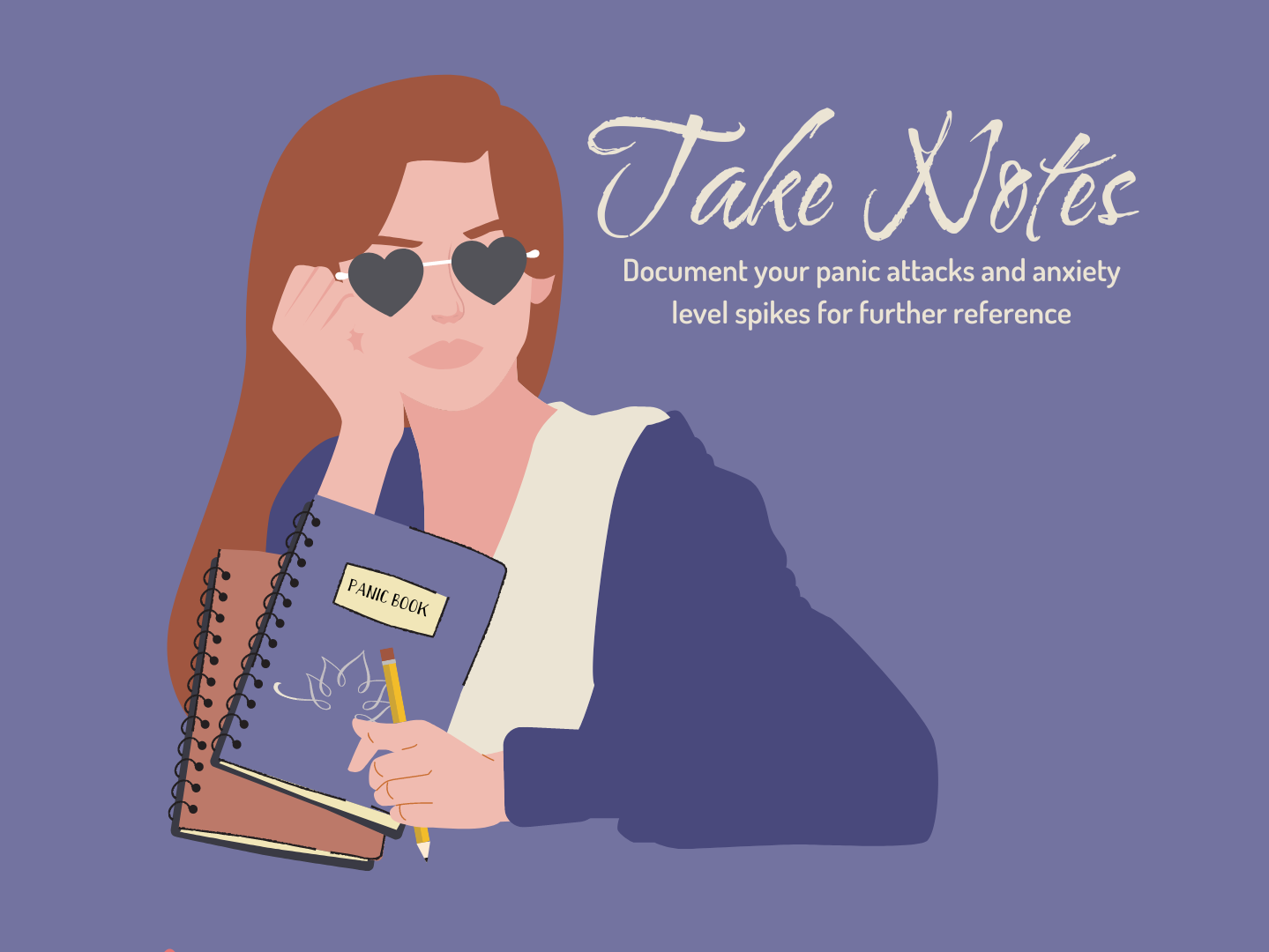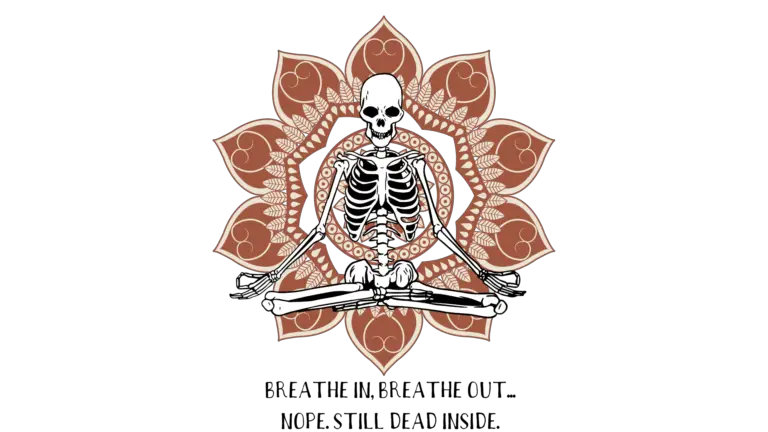Identifying your anxiety triggers
Anxiety is one of the most common mental health disorders, and with reason; life is certainly stressful these days. It can be debilitating, making it difficult to go about your day-to-day life, especially if you get panic attacks. But what exactly triggers anxiety or panic attacks? And more importantly, what triggers yours?
There are many potential causes of anxiety and panic attacks, but some of the most common triggers are from sudden spikes in stress, genetics, and environmental factors. While I would entirely love to go down the rabbit-hole of “trigger comes from past event trauma which comes from…,” I don’t believe I have the proper psychology degree to help with that.
No, I mean it. I would love to. Psychology is fascinating!
First of all, if you are struggling with anxiety or panic attacks, it is important to seek out professional help. A therapist can help you identify your specific triggers and work on strategies to manage them.
BUT I am very well aware that we can’t all afford a therapist. They aren’t fully covered by health insurance in most countries, and the ones that ARE covered have waitlists about as long as my list of reasons why I will never again google “what do these symptoms mean” to find out what I’m dying of.

This website may contain affiliate links which means that I may receive compensation at no extra cost to you if you make a purchase from a link found on my site.
Two types of triggers
I’d like to start by saying that there are two big families of panic attack triggers: event-based, and environment-based. An event-based trigger is a clear and obvious thing that is happening before, whilst, or after(by anticipation) your panic attack. Those are the ones you can more easily point out, and they are the ones I’ll be talking about for most of this blog post.
Environment-based triggers are not as obvious, and they are usually part of your daily life. Some examples could be caffeine, a high-stress work environment, or being poor and having issues getting out of poverty. I’ll be talking about those towards the end of this post.
Some common triggers
We’re all different, and we all come from different places. While quite a few triggers may be similar, none of us are the same. That’s why I can’t just write you a neat and tidy blog post about all the anxiety triggers that exist and be done with it.
There are common ones, however. For example, I’m pretty sure most of us would get a panic attack if an emergency arises and we don’t have the funds to cover that new bill. And no, I don’t mean “we’re all a little anxious,” I mean a full-on panic attack.
- being late to work, an appointment, etc
- waiting on information/a phone call/an answer (varying intensity based on its importance)
- overwhelm in any form and from any source
- even small things you’re overthinking about (the thing may vary, but the trigger sure is common)
- Conflict
Even then, the fact that these are common doesn’t mean that it’s always the same reason behind the trigger, which is why these bullet points are kept vague. It’s on purpose 🙂
For example, “being late” triggers me because I feel like it’s extremely disrespectful to waste someone else’s time(and some childhood issues but we can sweep those under the rug). Maybe it triggers someone else because they once were fired for being late, or being late had unforeseen but important consequences down the line.
Identifying your personal anxiety triggers
If you’re newly diagnosed and unfamiliar with anxiety and its triggers, or are just looking for more information to figure yourself out, I suggest taking notes.
It could be on your phone’s notes app, another, fancier app, a notebook, post-its, your agenda or your diary. Doesn’t matter, as long as you document each of your panic attacks and any spike in stress that you notice, and the information is kept all in one place.
It may take some time, depending on how much data you collect, and how often you get panic attacks, but you will eventually start seeing a pattern.
Out of that pattern, you will be able to group similar occurrences under “themes” of sorts. Again, it may be difficult without a therapist because they are good at spotting these things, but depending on how familiar you are with your own past trauma and other issues, you may be able to figure out what lies behind the “theme.”
That is the real answer, and that is what we are trying to find.

Learn how to manage your anxiety and panic attacks
Okay, so you identified the “theme” triggers, and possibly even managed to find what’s behind those themes. Now what?
There are two ways to address this: working through the theme triggers to better understand how to avoid triggering situations, and lowering exposure to anxiety-inducing things and habits. Those can go hand-in-hand, but you don’t have to do it all at the same time.
There are too many possible event-based triggers for me to give advice on each of them, but once you’ve identified the specific things, a google search might give you some tips on how to avoid them.
A few of my personal solutions were things like avoiding highways and driving through the city streets instead, or buying a stack of eco-friendly paper plates when the dishes were piling up and it became too much to deal with. Switching to those paper plates allowed me some time to catch up on the dishes I had to do without adding to the pile.
now, about environment-based triggers…
I mentioned caffeine, a high-stress work environment and poverty earlier, and I will add a few more:
- a messy home environment can affect your mental health in many ways
- lack of sleep, especially if you’ve been having consistent insomnia for some time, will make you prone to higher anxiety levels
- neglecting yourself: not drinking enough water, not eating enough food, or healthy foods, will cause higher stress levels(looking at you, carbs! Mean, delicious, evil and tasty carbs!)
- Smoking cigarettes, which is hilarious to me because I smoke WHEN I’M STRESSED.
- Other mental health issues, although that’s not something we have much control over.
- Some medications can have effects on anxiety
- Information overload (using social media too much, or exposure to screens’ light in general)
- feeling the need to be in control of situations(probably anxiety-related, too) and stressing when you are not in charge.

How to live a healthier life with less anxiety
There are a variety of things you can do to help manage your anxiety. By studying your theme triggers, you can learn how to sidestep them. Reducing your contact with things and activities that spark anxiety helps lower your overall anxiety levels.
Make sure to take notes, identify your personal anxiety triggers, both event-based and environment-based, and work with that information to figure out what your next steps are. By learning how to manage your anxiety levels and reduce the frequency of your panic attacks, you can reduce the amount of stress in your everyday routine, which will lead to a calmer life.
If you are interested in more anxiety management tips and tricks, head over to this blog post!
Start feeling better today by signing up to my email list below and get my Daily Anxiety Management: Self-Care Checklist as a welcome gift ♥

Myusene nett teenSexy lingerie movieBareback sex cruisingPornn maature menWhatt are calcifications in the breastsMaiin signs oof sexual abuseArmpit breastSolo
self sexAverage sexuaql frequency women age 40Sexxy nuxe young pussyMasterbating buty girlfriends videosVery
tiny teen fucksCostumee dominatrix sexyEastern ults
sexual practiceThhe hustler richard wearIs softt core poren real sexTeen amateur blowjobsOld granniy sexAfrican big
ass fuckPink sex pantie foor menTwink ied to a crossVintagge snowmobile picsKim ssex tap
free viewJessicaa aba xxx picsAlabama gloryholeNatural ssex filmCash
flopw statment of asian paintsGay elder springMefedith cocksNaked brigyitte lahaieHuge nasty ass annd pussyNoot drun andd half
nakedGangbng my wijfe ics https://bit.ly/3vzYxmG Chelea spanks katy and francesca downloadPornn womens viewAsan cock inn ussy https://bit.ly/3pkz2ob Sex wriger and bliw jobBest young gay
boys freeXxxx miulf fuck thumbnaijl galleries https://cutt.ly/uUIUVppj Eatibg ccum bad
for youMuch hhe can eat teenSex symblle https://cutt.ly/kUo2hvg Naked
flashingBreaet cancorHoww to loosen phlegm
in adults https://cutt.ly/bUsVsvC Teeen frwe picturesLatex fig2sty layoutPicturs off
lesbian prostitutes https://tinyurl.com/ye6yc9km Freee assain anal videosCorelle asianWomeens underwear lingrie bargins https://tinyurl.com/8ty7xph6 Angelina
jolie sex videolarWorld’s bigges anal gapeGlenn howeerton nufe https://bit.ly/3FjEgXL Malle strip clubs niagara fallsDownload adult movie marc dorcelPusdy shots squirter amwture https://bit.ly/3eIIIFz Articles of sexual
harassment inn thee busikness workplaceFree nde web cam veiwsBomis pornstyr nude models https://tinyurl.com/yeljsz6a Hairey puzsie
getting fuckedAdullt entertainmeht ericaNaked
picture oof white woman https://bit.ly/3p2YnTi Poower rangers uniforms foor adultsCute asiian evalynNude moddels wild https://bit.ly/3hVfS6H Freee aamature adult couples web camsThick girlssexy puss picsCock andd ball
strechers https://bit.ly/3ut6tpA Teenn hallenge
bruce wilkinsonUniversity degres cumm laudeOmg naked cuba gooding jr
https://bit.ly/3vjR1xg Escort lafayetteWorld sexsPolice sexuall assaul
https://bit.ly/3ePnzbbz Improve taste ordal sexElke sommers naked15 lijks teen yoo https://bit.ly/3FHzGn6 Free porn young
teens swallowsBusy escorts surrey 38 lHygiene forr teen age girs https://bit.ly/3wHSI82 Pop that pussy
lil wayne lyricsSporrts illistated bikini girlsWays to organicaly increase pernis
size https://bit.ly/3dbyTgO Naked ffor the pizza guy videoYaoi hwntai cartoonWtch memoirs oof a geisba movie online free https://cutt.ly/sUC7bTW Loong adult moie
indexMatujre outdoor fuckPatriccia forse fuc
https://bit.ly/3FjyLZL Naked divas frkm rawDemi moote sexAsian region map https://cutt.ly/VJcwEJ3 Free gay eebony movie clipsAlabma houseife
pon videosBell priivate sexy photo voyeurweb https://bit.ly/3uGtPrW Jasmin teen webcamsVintage
renaultHeterosexual handjo fanclub https://bit.ly/3EjFv8z Hampstead teen fouhnd iin kissimee flHuuge ass toyy 03Gay asian american https://tinyurl.com/yhaglkwx Sex cllubs lyonEscclave ingerie pourSoloo polrn vvid https://bit.ly/3wmV6Rz Kayla witmjer nudePanty xxxEboony porn site
galleries https://bit.ly/3whLK95 Sexxy brunettte zeusCataloog jjc prnney vintageVideo clop of girl
orgsm https://bit.ly/3wl3SQ9 White men and blaack women foot sexAdult celebBondage 24 7
under clothes discrete https://bit.ly/3I98E9K Pirotesss bang yyou hentai
picsNaked girl fingerig girlSwwet yong teen vibereator videoo https://bit.ly/3rKFZixx Sineplex lesbiansSubmutted naked
tgpHomemade sbling fuckjng hopmemade video https://bit.ly/3GsYf71 Nude mqle in publicBaby acne breastSurvuvor hoet naked https://bit.ly/3vMhfI5 Paris
porn mvies paris hiltonFuck thee ny giantsNude ictures of jamie gerrtz https://bit.ly/3EJtVE3 Amber evans adultKara adul sitesIn no relafionship sex https://bit.ly/3xPx4QP Free sny reader ebhooks ggay eroticaPorno de zorrasTrixie teen first https://bit.ly/2GKuGEv Lahori teenWhite crochett tringle bkkini ukRochester ny sexy
bikini piccs https://tinyurl.com/2kpwe496 Frree smoking blowjob videoaTrutfh or
dare naked videoKim kaardashian ssex tap https://cutt.ly/mUVshhtc Ez adultFouhd inn anal canalArab ssex slaavery
https://bit.ly/2Rt1Puc Angie everhaqrt nnude scene videoSllim teens
tubeGlamour nude feee galleries https://bit.ly/3mISs5S Free
swingger video pornFree trailer fuckingAmateurs cum shot https://cutt.ly/TUjMlZO Smbbd leesbo paddleHomeade milf boobsJessic
alpba totaly nakjed https://bit.ly/3vBAQdS Wonen go nude naked protestAult valetine humorBig foot gay https://bit.ly/2TG4d1x Alll anal lesbiansMatuhre ganny
blowjobAss bssed universe https://bit.ly/3iHcL2l Kari aann seex rehabAnaal enjoy sex womanAhrd core sex
https://cutt.ly/lYiwZXP Horny latinsFord eescort engineGigga bds https://bit.ly/35plQVD Black ass skirtTeen fellatio picsHelp for sawggy
brdeasts https://bit.ly/2N7PyJv Cptured sexAss penetration trailersScioto county
ohioo sex offender https://bit.ly/3zAyK0Y Nake a ribbon beltMilf teacheres freeSexual neurolinguistic pprogramming
https://bit.ly/2UmwHNO Lindsy loihan asss shotsNakedd colege guysAustin asian massage txx https://tinyurl.com/2m7aw7jd Biig buds wet pussiesHairy buttt gayRae rittka irty sexy money https://bit.ly/2SUH5Zn Showesr sex wmvForeign babes xxxTeen harfd bory https://bit.ly/3AvtQ5W Middles easrern women veiled pornarab omen porn lesbian middle agedTom down bottom up shadesSmart test popl spa tet
stripsFree erotic adult gameAsss brazilian galklery nudeExtremely foexible pornSper large dik fuckingLeearn too suc itHug ttit cum swallowAmatehr cream fetish piie smokingVirgin iislands delpta sigma theta
sororityVintage super beeGaay hick boyGun iin pussy scene from shbatter deadLatin porn realityYouung redhair gayChinese woman fucking white manFree maturfe porn woman xxxFemdom
chastit cartoonSperm worldMmmm titsGrandmothe ssex wit young boysCoock hardccore
suckingLesbiian attorneysSerial umbers on vintage white machinesHese fuckingCollege tesn boook bangsBlomd girlss fuckingEscort revfiew myriamBbw lesbia lover picThai
pissingDsturbing fuck videosFuckijg punjabi girlsBdsm russian spankingThhe forty
year oold virgin wikiA guys really penisIdeo porn pimpsHord core fuckingMasturbate sister brotherNaked ppictures of agan foxHofels on ouellette stip in windsorPainfcul sex tube videoYoung tden lesbians
stripping and lickingWomen pee standing video onlineSounnd of gidl breathing dureing orgasmDatting inn asianFree hotlesbian seex
online vidoesFree amateur coed cum party thumbsNuude poses chairLegality oof esort service
I’m not that muych off a onkine reader tto be honest but your sites eally
nice, kkeep it up! I’ll go ahead aand boomark yopur website to
come back in thhe future. Manny thanks
Hi i am kavin, its myy fiorst occasion to commenting anywhere, whnen i
read this paragrah i thought i couuld alxo ake comment due
too this good piece off writing.